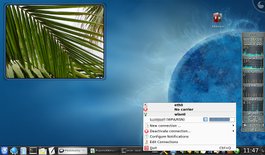KNetworkManager/de: Difference between revisions
Created page with ''''KNetworkManager''' ist ein KDE-Klient für die Hintergrund-Software NetworkManager. '''KNetworkManager'' kommuniziert mit NetworkManager via DBus (eine Art von systemweitem Na...' |
Updating to match new version of source page |
||
| Line 6: | Line 6: | ||
|} | |} | ||
<span class="mw-translate-fuzzy"> | |||
'''KNetworkManager''' ist ein KDE-Klient für die Hintergrund-Software NetworkManager. '''KNetworkManager'' kommuniziert mit NetworkManager via DBus (eine Art von systemweitem Nachrichten-Kanal zwischen den Anwendungen). {{KDE3}} | '''KNetworkManager''' ist ein KDE-Klient für die Hintergrund-Software NetworkManager. '''KNetworkManager'' kommuniziert mit NetworkManager via DBus (eine Art von systemweitem Nachrichten-Kanal zwischen den Anwendungen). {{KDE3}} | ||
</span> | |||
One typical usage is to connect to a wireless network with credentials known to the user. The user will setup a connection and '''KNetworkManager''' will store the settings wherever the user's configurations are stored. The configuration will include things like the name (''ESSID'') and passphrase used to associate with a particular wireless network. '''KNetworkManager''' can then use this information by packaging it into a DBus request to connect to a particular network. The Network Manager back end then does the low level operations required to actually setup the support software (e.g. pushing ESSID and key to '''wpa-supplicant''') and bring up the network device with the appropriate settings. | One typical usage is to connect to a wireless network with credentials known to the user. The user will setup a connection and '''KNetworkManager''' will store the settings wherever the user's configurations are stored. The configuration will include things like the name (''ESSID'') and passphrase used to associate with a particular wireless network. '''KNetworkManager''' can then use this information by packaging it into a DBus request to connect to a particular network. The Network Manager back end then does the low level operations required to actually setup the support software (e.g. pushing ESSID and key to '''wpa-supplicant''') and bring up the network device with the appropriate settings. | ||
| Line 17: | Line 19: | ||
:More [http://old-en.opensuse.org/Projects/KNetworkManager_Screenshots screenshots] show its use on different desktop environments. | :More [http://old-en.opensuse.org/Projects/KNetworkManager_Screenshots screenshots] show its use on different desktop environments. | ||
[[Category: | [[Category:Internet]] | ||
Revision as of 18:55, 21 October 2010
Template:I18n/Language Navigation Bar
 |
Verwenden Sie KNetworkManager, um Ihre offenen und verschlüsselten Verbindungen zu verwalten. |
'KNetworkManager ist ein KDE-Klient für die Hintergrund-Software NetworkManager. KNetworkManager kommuniziert mit NetworkManager via DBus (eine Art von systemweitem Nachrichten-Kanal zwischen den Anwendungen).
![]()
One typical usage is to connect to a wireless network with credentials known to the user. The user will setup a connection and KNetworkManager will store the settings wherever the user's configurations are stored. The configuration will include things like the name (ESSID) and passphrase used to associate with a particular wireless network. KNetworkManager can then use this information by packaging it into a DBus request to connect to a particular network. The Network Manager back end then does the low level operations required to actually setup the support software (e.g. pushing ESSID and key to wpa-supplicant) and bring up the network device with the appropriate settings.
Along with the advantage of allowing normal users to control the configuration the network it also allows one consistent interface for network configuration on KDE, and other desktops (e.g. GNOME) can use the network manager back end without each having to implement the logic to handle network configuration.
- The Project Page gives an overview of features, some screenshots, and links to packages for several distros.
- More screenshots show its use on different desktop environments.
